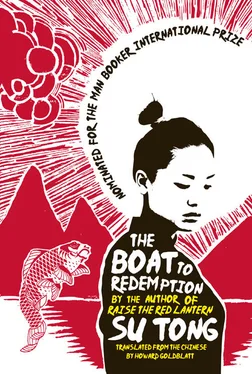Eventually I became a true splay-footed walker. My father did not influence my general health, but I became infected with a germ called ‘halves’. As I looked at the world of the river around me, I arrived at the bizarre conclusion that only half of my world remained. Birds on the shore danced and sang as the water rushed along, but there were no dancing or singing birds around me, just rushing water, and I found that water disgusting. I rode up and down the river behind a fast-moving tug that towed our barge in a mad dash. The wind, the speed and that mysterious germ came together to launch an assault on my eyes and ears. No matter how stirringly the loudspeaker on the shore blared its messages, I only ever heard the first half, the remainder blown away by the wind. When I stood at the bow trying to take in the sights on both banks, if my eyes focused on the wheat fields to the left, I forgot about the market towns on the right and could not tell the difference between the places we’d just passed. The scenery changed with each successive day, but my hasty glances created a half-baked understanding of the triumphant socialist construction on the banks of the river. When we passed a duck farm, I saw workers laying a foundation and digging a ditch on the sandbar; I didn’t know it was the Victory Hydroelectric Station and assumed it was just an extension of the duck farm. I grumbled at the sight, wondering why the ducks were being treated so well when I didn’t even have a home on shore. When we sailed past Phoenix, I saw people building a cement pylon to the east, and all I could think was, ‘They’ve just built a hydroelectric station near the duck farm, and now here’s Phoenix building another.’ Was it a competition? I was oblivious to the fact that an identical pylon was going up on the other bank, and that Phoenix was in fact getting not a hydroelectric station but a new bridge.
The people on shore were all talking about Milltown, my hometown, and how it was undergoing a spectacular transformation and would become a key sector, the most important one in the Golden Sparrow River region. Word had it that a secret combat-readiness facility was to be constructed in Milltown, but since it was all hush-hush, no one knew for sure what sort of facility it would be, which was why everyone — on shore and on the river — was talking about it. Some thought it might be an air-raid shelter, others that it would be a missile-launching site, while some predicted that it would be a petroleum pipeline that served the Southern Combat-Readiness Base. After hearing more and more comments, I finally worked out what they meant by a ‘key sector’, but had no way of telling whose prediction was more reliable. If Father had still been in office, I’d have been privy to first-hand information. Too bad. As they say, a river flows east for thirty years, then west for the next thirty. Father and I were now the last to hear any news relating to the Golden Sparrow River region.
I never liked asking people for news, and in my personal investigation into signs relating to the military construction, I found none. The General Affairs Building was still the highest authority in Milltown. The skies were bluer than before, the air cleaner, and production on the wharf was being reorganized. The mountain of coal had been pared down; commodity storage, always haphazard, was being systematized; and relatively clean public toilets had appeared, with the smell of disinfectant lying heavy in the air. Other than that, there didn’t seem to be any earth-shaking changes or improvements in a town that was the focus of public opinion.
One day I was walking down by the piers when I passed a chemical warehouse and was surprised to see that it had been newly painted, white with red windows. A sign on the door read: ‘Pier Security Group’. I stuck my head through the door and spotted familiar faces: Scabby Five, Baldy Chen and Wang Xiaogai, each sporting a red armband with the words ‘You Zhi’ printed on them. I quickly figured out that it stood for Milltown Zhi-an , or Security Group. After the words came some Arabic numbers in parentheses, evidently their personal numbers. I knew what the armbands meant, but I was in a teasing mood. ‘Does that say “Lard-town”? Are you the lard group? If so, you belong in a wok.’
Their expressions hardened when they heard my voice. ‘What do you know?’ Xiaogai said with a disgruntled look. ‘Can’t you read? We’re the Milltown Security Group.’
‘Security group?’ I said. ‘Under whose authority?’
‘The General Affairs Building, pig brain. What do you think?’
But I couldn’t let it go. ‘Three guys keeping watch over a rundown chemical warehouse, and you call it a security group!’
‘At the moment it’s just the three of us,’ he said, ‘but there’ll be more of us pretty soon. We might not have a big office, but we’ve got big-time authority, and we’re going to let you see just how big that is.’
With obvious impatience, Scabby Five, my long-time foe, glared at me and cut his colleague off. ‘What are you doing, explaining things to someone like him?’ he said, making a handcuffing gesture. ‘He wrote a counter-revolutionary slogan, and that makes him a target for us! If he doesn’t watch his mouth, I’ll come down hard on him.’
Nothing but farts came out of Scabby’s mouth — empty, stinky talk — and I wasn’t about to argue with him. I focused my attention on the sign on the door. ‘ Zhi-an ,’ I said. ‘Do you know what that means?’
Blinking furiously, Xiaogai glanced at his two colleagues, looking for help. But, less well educated even than him, they too were stuck for a response. Having suffered an embarrassing loss of face, he growled, ‘You and your goddamn never-ending questions, Kongpi. It means just what it says — zhi-an . Don’t try any of your tricks on me.’
I wasn’t trying to trick him. I knew that the word an meant ‘safety’, but I didn’t know if zhi meant to take charge of people or to make them suffer, so I said, ‘Since you have no authority over the goods or the longshoremen, who are your supposed zhi ?
Scabby Five was the first to react. ‘Good question!’ he said hatefully. ‘And the answer is you!’
‘Not only you,’ Baldy said, ‘though you’re the one we need to watch the closest. We’re charged with watching the whole fleet.’
Wang Xiaogai, who had a ‘2’ on his armband, was the group’s second-in-command, I later learned, so no wonder he talked like a bureaucrat. ‘And not only you people on the barges,’ he said as he adjusted his armband. ‘These are critical times, and things get busy at the police station, so we’re in charge of wharf security — all of it.’
I looked up into the blue sky, with its patches of puffy white clouds, then stood on my tiptoes to gaze at the top of the General Affairs Building — no signs of those so-called critical times, as far as I could see. ‘What’s all this nonsense about critical times?’ I said. ‘What’s so critical about them? I for one can’t see it.’
‘If we let a kongpi like you see things,’ Wang Xiaogai said with a sneer, ‘they wouldn’t be critical, would they?’
Usually, when we pulled up to a pier, I avoided the other boat people, either by going ashore before or after them. On this occasion I’d been the first person ashore, so after leaving the Security Group office, I headed for Milltown. But I hadn’t got far before Wang Xiaogai and the others caught up with me. ‘Stop right there,’ they called out. ‘You have to wait till everyone’s ashore, so you can all go into town together.’
‘Says who?’ I said. ‘We’re boat people, not soldiers. Why do we have to travel as a unit?’
Читать дальше












